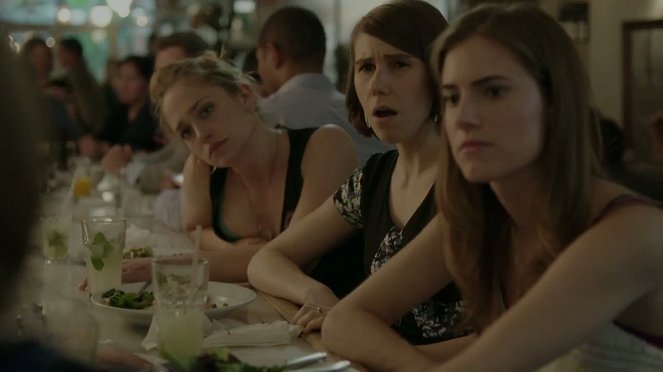Alkotók:
Lena DunhamZeneszerző:
Michael PennSzereplők:
Lena Dunham, Allison Williams, Jemima Kirke, Adam Driver, Zosia Mamet, Alex Karpovsky, Andrew Rannells, Peter Scolari, Becky Ann Baker, Chris O'Dowd (több)Streaming (1)
Évad(6) / Epizódok(62)
Tartalmak(1)
Az HBO mozicsatorna saját gyártású vígjátéksorozatának ötlete Lena Dunham fejéből pattant ki. Az önéletrajzi ihletésű széria érdekessége, hogy Lena az egyik női főszereplő, Hannah megformálását is magára vállalta. A huszonhat éves színésznő univerzális tehetség, forgatókönyvet ír, rendez, sőt esetenként produceri feladatot is vállal. A történet amúgy néhány, a húszas évei elején járó lány hétköznapjaiba nyújt bepillantást, akik New York Cityben élnek. Akár a néző szomszédjában is lakhatnának: fiatalok, vidámak, és életük nem nélkülözi a váratlan fordulatokat. (HBO Europe)
(több)Recenziók (3)
This bitterly comedic series about four New Yorkers in their twenties who are trying to find work, maintain their relationships and preserve their sanity is much more than an earthier version of Sex and the City. The generational statement mines the aesthetics of a number of American indie films (not only Dunham’s) and elaborates on their themes. Girls shows us that emphasis placed on the authenticity of the statement (as in Louie) doesn’t necessarily have to be bought through resignation to visual elegance (also as in Louie). ___ The series captures the viewer’s attention from the first episodes with its simple yet coherent style with thoughtfully composed shots, cautious use of details and close-ups of the characters’ faces (the narrative is predominantly subjective, usually connected to the point of view of one of the protagonists, whose world we practically never leave), documentary-like use of real locations in (not only) New York and subversive use of genre conventions. ___ The series also goes against convention in its representation of women. Rather than walking stereotypes defined by their role as either a girlfriend, mother or wife, they embody what women still do not receive in the entertainment industry – complexity and diversity. They sometimes make foolish decisions, behave selfishly and suffer from various neuroses. At the same time, they are ironic, impudent, intellectually curious and very self-confident. ___ Due to the creator’s unwillingness to make dramaturgical concessions because of her characters, the wager on genuineness is manifested not only in the malleability of the characters and the convincing depiction of the setting, but also in the series’ formalistic looseness. The episodes, which usually exploits a single setting or motif, do not work as concise sketches with a gradual build-up and apt point. Instead, they often end up in the void. Instead of abrupt twists, they work with hints and subtle shifts in the protagonists’ character development. ___ With each season, it also becomes increasingly clear that Dunham is maturing as a director and adapting her signature style more to the norms of contemporary television production. But even that smoothing of the rough edges hasn’t turned Girls into a series that would sympathise with its narcissistic characters and defend their shortsighted lack of criticalness. On the contrary, the brutal honesty of the series began to serve a more obvious purpose. It is no longer so often about honesty for the sake of honesty, but honesty serving the story and the development of the characters. ___ I realise that Girls is a distinctively generational matter and that, in a few years, I will be dealing with something other than friendship and enmity, trust and self-confidence, career and self-education, but I currently find the series to be the most useful simulator for life situations that one may encounter after university. With its piercing observations about relationships, it is both uncomfortably true and unbelievably funny. For both girls and boys. For those who are dating someone and for those who want to date someone. After life itself, Girls is currently the second best school of life for me. 90%
()
(kevesebbet)
(több)
“I give zero fucks about anything, yet I have a strong opinion on everything, even topics I'm not informed on." First thing which comes to my mind is to write that it is Sex in the City (because a comedy drama from the life of four gentle women in New York under the auspices of HBO) for the younger generation, but it would not be fair to this self-proclaimed generational statement, let alone apt. The two series couldn't be more different in terms of style, humor, target and focus. Sex and the City was an unwanted parody of itself (and therefore an excellent guilty pleasure, that is true) about the age of the "pretend we're in our thirties" and not very bright city cows on high heels and their search for guys/clothes/cocktails and… And nothing more. The neurotic Hannah aka Lena, very much and sometimes to her detriment wannabe Woody Allen in a female version. Dunham has definitely a lot to say about this generation of privileged white people "who do not know what else to do", adolescence, self-search, independence, relationships and life as such and is not afraid to say it very openly, hard, to the point, self-ironically, vulgarly and uses strange sexual aspects and practices. The only question is whether what he says (and especially how he says it; whether through his alter ego or his words that are told by life characters) is something you want to hear in the first place. And this is the polarizing point, because for the fact if you like it or not depends on if you can (not) handle the very unique speech of Lena Dunham. It will either get on your nerves (and through it even the whole series, because he is behind the typewriter, behind the camera and in front of it) or not. And in none of those cases it is not surprising, but if nothing else, it's a grateful target for apt sketches | S1: 3/5 | S2: 3/5 | S3: 5/5 | S4: 5/5 | S5: 4/5 | S6: 4/5 |
()
Season 1 – 80% – In the seemingly well-plowed field of the relationship genre, you can still find something new. Or rediscover something completely obvious – like the truth. Lena Dunham writes her group of girls so convincingly that some situations, flare-ups, and breakups play out with an authenticity that rides familiar shivers down your back. However, with that comes the danger that just like in life, some people won't appeal to you, which applies to most of the male characters (the awkward Charlie or the creepy Adam) and unfortunately also to the main female character. Hannah is interestingly talkative, but also self-absorbed, somewhat selfish, and very often strange in an unpleasant way. It is surprising that I am greatly entertained by the remaining three girls, even though they decide to do everything but the right thing. And they are surprisingly confident about it. Season 2 – 70% – If this is how things actually are in reality, then I officially declare that I understand girls no more now than I did during puberty. It's just a shame that I'm starting to understand the whole series less as well. The dialogue is still written in gold, but the season as a whole has not grown on me (despite the perfectly developed first half). I don't buy the OCD storyline, I don't buy the suddenly successful Charlie, and I also have a problem with the transformation of Adam into a likeable damaged guy with a sincere heart. Thanks to a few great ideas (the episode with Patrick Wilson), a tastefully compiled soundtrack, and the roller coaster ride of Marnie, it is still watchable without hesitation. But I'm starting to worry that the girls are losing a piece of their hearts. Season 3 – 75% – A bit of helplessness on my part, and maybe even a safe bet on the part of the series. The biggest question mark for me is still that masochism when Lena writes herself as the most unbearable person under the sun. Even the eccentric Adam or the spoiled Shoshanna with her year of freedom can be seen as interesting characters, but I meet Hannah's every decision with a silent grinding of teeth. And it's a shame, especially since the third season raced forward very confidently, and with the confused (yet still the most golden) Marnie or the amazing scene-stealer Elijah, it deserved a much higher rating. However, it is a very nice above-average show with a script based on random stories without an escalating plot. If it maintains this level, Girls can easily function for five more seasons. If it slips, the concept will get boring within a few episodes. Season 4 – 85% – I suspect Miss Dunham felt happy in her personal life when she wrote about the latest experiences of the main characters. Despite various relationship or family kerfuffles, the fourth season of Girls exudes a constant dose of optimism and an undeniable glimmer of hope. Thanks to this, Ray is suddenly not just an inconspicuous mold, but a likable guy, and Adam, despite one crucial mistake, becomes a surprisingly nice guy. Even Hannah's selfishness suddenly makes sense and is easier to understand. Maybe Jessa wouldn't have to be on the verge of death in every sardonic speech, but you can't have everything. I had no fear at all about the overall direction of the series thanks to imaginative supporting roles played by familiar faces and confident scripts that are not afraid to tackle unconventional topics. And as it turned out, this was right on the money. Season 5 – 100% – Jessa is still unbearable and yet sometimes I fully understand her. Marnie is still caught up in details and yet I cannot help but love her. Shosh continues to be insecure in moments when it is not at all necessary, and yet I root for her. And lastly, Hannah is the biggest stubborn mule, and self-centered to the point of madness, and yet I just want to see her happy. Girls has matured just as Lena Dunham has matured. It's not afraid to experiment (a solo episode in Tokyo, Marnie's introspection through a visit to her own past) and it ultimately reaches its intended destination. A conversation gem that can only offend or enthuse with its unique humor. The perfection was always there, it just took four seasons for it to come out. Season 6 – 100% – Whether the main characters are enjoying joy or suffering, dealing with work matters, or closing and reopening the relationships that the viewer has been following for six years, it is evident that we have all experienced something similar, felt this way at this age. Moreover, not only has Lena Dunham matured as a creator, but this time she also reaches the peak of her acting skills. Whether she is enjoying a seaside destination, dealing with a new chapter in her life, or facing what Adam meant, means, and could have meant to her, she is so precise and sensitive at the same time that I would not hesitate to hand her a Golden Globe. This is a heroine who can only make you cry or laugh. If you had told me a few seasons ago that Hannah Horvath, who seemed spoiled and ungrateful at the time, would be a character I would breathe for, just so I could help her in some way, I would have laughed at you. And that's where I see the biggest transformation, which turned me from a cautious supporter into a genuine fan who recommends the series to everyone. While the first three years were a pleasant conversation with weaker and stronger moments, the last two years are pure gold taken from life, and to me, they represent the pinnacle of what has been seen on television.
()
(kevesebbet)
(több)

